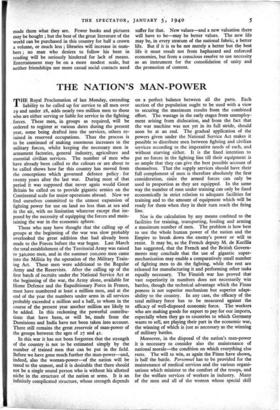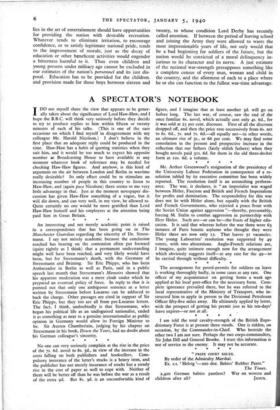THE NATION'S MAN-POWER
THE Royal Proclamation of last Monday, extending liability to be called up for service to all men over
19 and under 28, adds nearly two million men to those who are either serving or liable for service in the fighting forces. These men, in groups as required, will be ordered to register at various dates during the present year, some being drafted into the services, others re- tained in reserved occupations. Thus the process is to be continued of making enormous increases in the military forces, whilst keeping the necessary men in armament factories, general industry, agriculture and essential civilian services. The number of men who have already been called to the colours or are about to be called shows how far this country has moved from the conceptions which governed defence policy . for twenty years after the last war. During most of that period it was supposed that never again would Great Britain be called on to provide gigantic armies on the Continental scale for major operations abroad. Now we find ourselves committed to the utmost expansion of fighting power for use on land no less than at sea and in the air, with no limitation whatever except that im- posed by the necessity of equipping the forces and main- taining the war in the economic sphere.
Those who may have thought that the calling up of groups at the beginning of the war was slow probably overlooked the great addition that had already been made to the Forces before the war began. Last March the total establishment of the Territorial Army was raised to 340,000 men, and in the summer 200,000 men came into the Militia by the operation of the Military Train- ing Act. These men were additional to the Regular Army and the Reservists. After the calling up of the first batch of recruits under the National Service Act at the beginning of the war, the Army alone, available for Home Defence and the Expeditionary Force in France, must have numbered at least a million men, and at the end of the year the numbers under arms in all services probably exceeded a million and a half, to whom in the course of the present year another million are likely to be added. In this reckoning the powerful contribu- tions that have been, or will be, made from the Dominions and India have not been taken into account. There still remains the great reservoir of man-power of the groups between the ages of 27 and 41.
In this war it has not been forgotten that the strength of the country is not to be estimated simply by the number of trained men that can be put in the field. Before we have gone much further the man-power—and, indeed, also the woman-power—of the nation will be taxed to the utmost, and it is desirable that there should not be a single sound person who is without his allotted niche in the structure of the nation at arms. It is an infinitely complicated structure, whose strength depends on a perfect balance between all the parts. Each section of the population ought to be used with a view to securing the maximum results from the combined effort. The wastage in the early stages from unemploy- ment arising from dislocation, and from the fact that the war machine was not yet in its full stride, should soon be at an end. The gradual application of the powers given under the National Service Act makes it possible to distribute men between fighting and civilian services according to the imperative needs of each, and without starving either. It is the fixed intention to put no forces in the fighting line till their equipment is so ample that they can give the best possible account of themselves. That the supply services should have their full complement of men is therefore absolutely the first consideration, since the armed forces can only be used in proportion as they are equipped. In the same way the number of men under training can only be fixed economically in strict relation to adequate facilities for training and to the amount of equipment which will be ready for them when they in their turn reach the firing line.
Nor is the calculation by any means confined to the facilities for training, transporting, feeding and arming a maximum number of men. The problem is how best to use the whole human power of the nation and the Empire to break down the enemy's power or will to resist. It may be, as the French deputy M. de Kerillis has suggested, that the French and the British Govern- ments may conclude that the use of gigantic super- mechanisation may enable a comparatively small number of fighting men to do the fighting, while the rest are released for manufacturing it and performing other tasks equally necessary. The Finnish war has proved that vast superiority in numbers does not necessarily win battles, though the technical advantage which the Finns possess is not superior mechanism but superior adapt- ability to the country. In any case, the efficacy of the total military force has to be measured against the efficacy of well-disposed economic force. The workers who are making goods for export to pay for our imports, especially when they go to countries to which Germany wants to sell, are playing their part in the economic war, the winning of which is just as necessary as the winning of military battles.
Moreover, in the disposal of the nation's man-power it is necessary to consider also the maintenance of national morale—the condition on which everything else rests. The will to win, as again the Finns have shown, is half the battle. Personnel has to be provided for the maintenance of medical services and the various organi- sations which minister to the comfort of the troops, and for the welfare services of workers in industry. Many of the men and all of the women whose special skill lies in the art of entertainment should have opportunities for providing the nation with desirable recreation. Whatever tends to eliminate irritation, to encourage confidence, or to satisfy legitimate national pride, tends to the improvement of morale, just as the decay of education or other beneficent activities would engender a bitterness harmful to it. Thus even children and young persons under military age cannot be excluded in our estimates of the nation's personnel and its just dis- posal. Education has to be provided for the children. and provision made for those boys between sixteen and twenty, to whose condition Lord Derby has recently called attention. If between the period of leaving school and joining the Army they were allowed to waste the most impressionable years of life, not only would that be a bad beginning for soldiers of the future, but the nation would be convicted of a moral delinquency in- jurious to its character and its nerve. A just estimate of the national war-strength presupposes something like a complete census of every man, woman and child in the country, and the allotment of each to a place where he or she can function to the fullest war-time advantage.



































 Previous page
Previous page